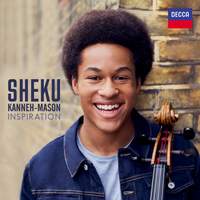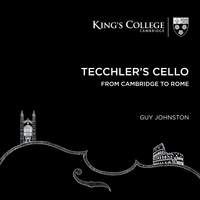Interview,
Sheku Kanneh-Mason on Inspiration
 At just 18, the British cellist Sheku Kanneh-Mason already has a CV that would be the envy of many people twice his age: since becoming the first black winner of the BBC Young Musician of the Year Competition in 2016, he’s made concerto debuts with Chineke! and the City of Birmingham Symphony Orchestra (reviewing the latter concert, The Guardian described him as ‘a cellist of poise and seriousness – bold in virtuosity, assured in musicianship’) as well as appearing at the BAFTAs and at 10 Downing Street and devoting a great deal of his considerable energy to improving access to music education, particularly in the state sector where he himself received his early training. Shortly after his BBC victory, he signed a recording-contract with Decca Classics, and this Friday sees the release of his first album, Inspiration, which reflects his wide-ranging musical tastes – Shostakovich’s First Cello Concerto sits cheek-by-jowl with arrangements of songs by Leonard Cohen and Bob Marley.
At just 18, the British cellist Sheku Kanneh-Mason already has a CV that would be the envy of many people twice his age: since becoming the first black winner of the BBC Young Musician of the Year Competition in 2016, he’s made concerto debuts with Chineke! and the City of Birmingham Symphony Orchestra (reviewing the latter concert, The Guardian described him as ‘a cellist of poise and seriousness – bold in virtuosity, assured in musicianship’) as well as appearing at the BAFTAs and at 10 Downing Street and devoting a great deal of his considerable energy to improving access to music education, particularly in the state sector where he himself received his early training. Shortly after his BBC victory, he signed a recording-contract with Decca Classics, and this Friday sees the release of his first album, Inspiration, which reflects his wide-ranging musical tastes – Shostakovich’s First Cello Concerto sits cheek-by-jowl with arrangements of songs by Leonard Cohen and Bob Marley.
I spoke to Sheku last week in between his classes at the Royal Academy of Music, where he’s currently an ABRSM scholar, to find out more about his career to date and the Inspirations behind his eponymous recording…
These are all pieces with a personal significance for you – could you tell me a bit about why some of them are special to you, and how you came to make such an eclectic debut recording?
I really just love to listen to great music: Bach and Beethoven wrote some incredible things for the cello, but there’s also a lot of fantastic music in other genres as well. The main work on the album is the Shostakovich, which is one of my favourite cello concertos, and I’ve spent a lot of time listening to Rostropovich’s recording; it’s also the piece which I was lucky enough to win the BBC Young Musician of the Year Competition with, so it’s a work that means a great deal to me and it was such a thrill to be able to record it. I’ve loved Bob Marley since I was very, very young (I remember growing up listening to his music a lot in the car with my parents) and outside of the classical world he’s one of my main musical influences. And Saint-Saëns’s The Swan is one of the first proper pieces for solo cello which I learned, when I was just starting out.
The spirit of two legendary cellists, Jacqueline du Pré and Pablo Casals, is evoked in your choice of repertoire: when did you first encounter their playing, and which contemporary cellists do you find particularly inspiring?
I started listening to Jacqueline du Pré when I was four or five – her recording of the Elgar Concerto was one of the things that really inspired me to play the cello. I discovered the recordings of Casals much more recently: I love his recordings of the Bach Suites in particular, and a not so well-known octet which he wrote called La Sardana which is an incredible piece - full of Spanish attitude! In terms of living cellists, I listen to Yo-Yo Ma’s Bach a lot, and I also really love Guy Johnston’s playing – I’ve been fortunate to play and record a few things with Guy and he’s been hugely inspiring and supportive.
You’ve already achieved an astonishing amount in your 18 years, both on a purely musical level and in terms of the work you’ve done to improve music education, access and diversity: what are your dreams and goals for the short- and long-term future?
There’s so much repertoire that I haven’t learnt and that I really want to learn! At the moment I just want to spend some time exploring all of this music and hopefully perform it around the world – that would be an absolute dream. I don’t have any further recording plans at the moment, but I’d love to record the Elgar some day… In terms of attracting new audiences, I still think that the single most important thing is simply being exposed to music (and be able to access music) from a very young age. I was lucky enough to grow up in a household where classical music was played all the time, but a lot of young people don’t get that opportunity to hear and fall in love with this music from childhood. What I always feel is that young children react to ANY kind of music in the most natural way: if you expose a child who’s never heard any sort of classical music before to an orchestral concert they really respond very instinctively, and seeing those reactions is one of the reasons I love playing to young audiences.
Your own arrangement of Bob Marley's No Woman, No Cry appears on the album and has been a huge hit on streaming services already – is arranging and transcribing something you’re going to do more of in the future, and do you have plans to publish this one?
Because I’m interested in such a wide range of music, arranging is something that I really enjoy doing – finding interesting ways of making things that you wouldn’t necessarily expect to work on the cello come to life. I haven’t actually written [the Bob Marley transcription] down yet, but it would be really great to give other people the opportunity to play it!
Inspiration is released on Friday on Decca Classics, and includes music by Shostakovich, Saint-Saëns, Pablo Casals, Bob Marley and Leonard Cohen.
Available Formats: CD, MP3, FLAC, Hi-Res FLAC
Sheku joins Guy Johnston for a sonata for two cellos by Jean-Baptiste Barrière on this musical exploration of the history of Johnston's 1714 cello.
Available Formats: CD, MP3, FLAC, Hi-Res FLAC




